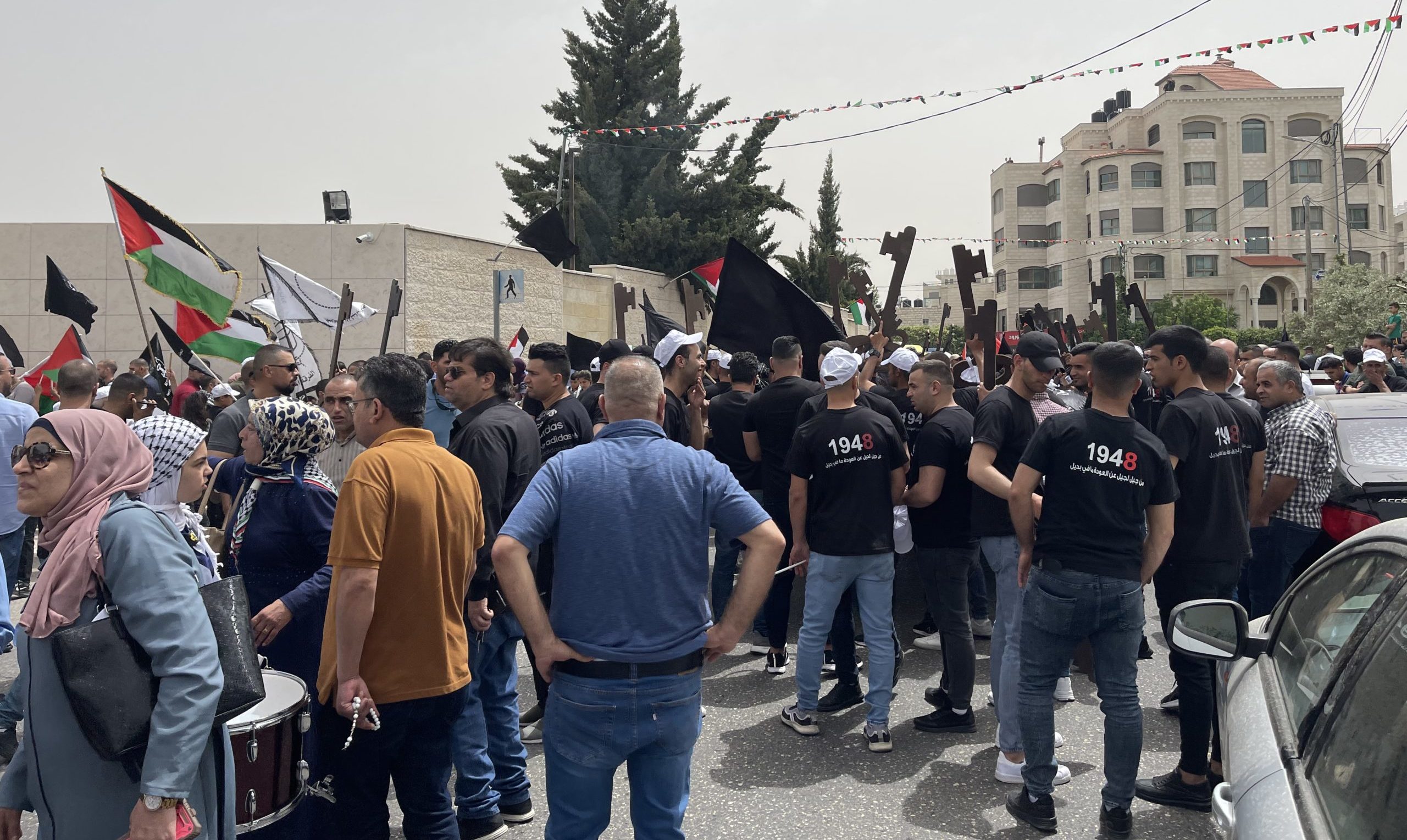Palestinians held rallies on Sunday to commemorate the Nakba, 74 years after Israel’s creation. The Nakba, Arabic for “catastrophe,” refers to the exodus of nearly 750,000 Palestinians who were expelled by armed Zionist groups or Israeli soldiers or forced to flee from their homes and villages during the 1948-1949 war that saw Israel emerge as an independent Jewish state.
In Ramallah, Palestinians of all ages waved flags and held giant mock keys, a widely used symbol of the Nakba, a reminder of the keys that many Palestinians have kept to their homes. They walked from the Yasser Arafat Mausoleum at the Muqata’a presidential compound to the city center.

Palestinians of all ages wave flags and hold giant mock keys, a widely used symbol of the Nakba, as they walk from Yasser Arafat Mausoleum to Ramallah’s city center, May 15, 2022, (Mohammad Al-Kassim/The Media Line)
Thousands converged on Manara Square for the annual demonstration, as sirens sounded for 74 seconds, one for every year, across the West Bank and the Gaza Strip.
Nakba Day is always emotional and difficult for the Palestinians, but tensions were higher this year over the death of veteran Al Jazeera journalist Shireen Abu Akleh, 51, who was shot and killed last Wednesday while covering an Israeli army raid on the Jenin refugee camp in the northern West Bank.
Palestinian Authority government spokesman Ibrahim Melhem told The Media Line the size of the crowd and the age of those in attendance were important.
“This means that the right of return will not be forgotten. The right of return will not be lost from the memory of the young or the memory of the elderly, and if the elderly die, the right is inherited by the young,” he said.
Ratiba al-Natsheh, a resident of east Jerusalem, told The Media Line her parents used to take her and her siblings to Nakba events, and she is doing the same.
“Today I came with my daughters to teach our children and raise them not to forget our rights,” she said.
Palestinian Authority President Mahmoud Abbas delivered a speech on the commemoration of the Nakba, speaking from Ramallah on Saturday evening.
“Staying on [the land], regardless of the difficulties, complications, and brutal crimes of the occupation, is the best response to the Nakba, and to the mentality of ethnic cleansing, settlement, and Judaization,” he said.
Mustafa Barghouti, secretary-general of the Palestinian National Initiative, a political party, told The Media Line that “7 million Palestinians today are deprived of the right to come to their homeland and today is the day to declare that we are all unified in our struggle to end not only the occupation but the whole system of apartheid and racial discrimination in the whole of Palestine.”
According to a report issued by the Palestinian Central Bureau of Statistics on the anniversary, the number of Palestinian refugees reached 6.4 million by the end of 2020.
Yusra Safi, 84, was born in Beit Nabala, a village near Lod. In 1948, she fled with her parents and two older sisters.
She told The Media Line that she remembers her father’s house, where she lived until the age of 10.
“My sister woke me up and told me, my people, that a plane hit the village. We took some things like blankets. We cried a lot.”
Safi has a sharp memory; she remembers many of the families who lived in Beit Nabala.
“Our house was big and the whole family would visit. I remember there was a staircase that took you to the second floor. It had 10 steps.”
Safi’s husband is dead and she lives with her eldest son, Ziad, and his family in the Jalazone refugee camp, near Ramallah. The camp abuts the Israeli settlement of Beit El, which is considered illegal by the international community.
Ziad, a 64-year-old father of eight, said commemorating Nakba is painful for him. He told The Media Line that his father used to bring the family to visit Beit Nabala. He has hope of one day returning to live in his village.
“I was in pain when we used to go to Beit Nabala and I didn’t want to go back home. I have a strong sense of nostalgia and a strong feeling for my village even though I was not born there,” he said.
His mother gave him an old, rusted key along with tax documents for his grandfather’s house. Safi said they were passed on to her by her parents, who told her to keep the key and “give it to your children. This key belongs to one of my grandparents’ houses in Beit Nabala,” she said.

Yusra Safi (2nd R), holding the key to her family’s home in Beit Nabala, a village near Lod, sits alongside her sons Abu Anan (L) and Ziad Safi (2nd L), who holds tax documents from the Government of Palestine, and her grandson Yusef Safi (R), at their home in the Jalazone refugee camp, May 15, 2022. (Mohammad Al-Kassim/The Media Line)
Today it is almost impossible to make out where the village’s houses were because of overgrown grass and trees, but Ziad said he appreciates the symbolism of the key.
“Although it was demolished, we preserve it because it is a trust from one generation to the next, and we will pass it on to future generations,” Ziad said.